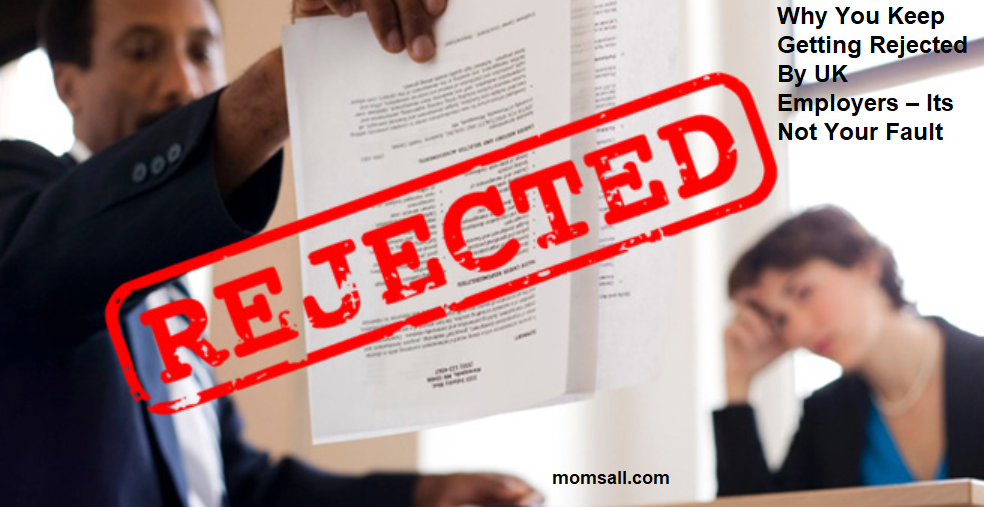Why You Keep Getting Rejected By UK Employers – Understanding the reasons behind repeated rejections by UK employers is crucial for individuals who find themselves stuck in a seemingly never-ending job search. While it can be disheartening, it’s important to remember that not all the blame lies with the job seeker.
In this comprehensive SEO content, we will delve into the key factors that may be contributing to your job rejections and offer valuable insights to help you navigate the challenging UK job market.
Read Also: Proven Strategies to Get Your CV Shortlisted For a Job in the UK
UK Dependent Visa Rejection Reasons
Securing a dependent visa in the UK is crucial for those who wish to join their family members residing in the country. Unfortunately, the application process can be complex, and there are several reasons why your dependent visa application might be rejected.
Understanding these reasons can help you avoid potential pitfalls and improve your chances of a successful application.
- Insufficient Documentation: One of the most common reasons for UK dependent visa rejection is inadequate documentation. The UK immigration authorities have strict requirements when it comes to supporting documents, such as marriage certificates, birth certificates, and proof of relationship. Failing to provide the necessary documents or providing incomplete or fraudulent information can lead to a rejection.
- Financial Ineligibility: Another significant factor that can result in dependent visa rejection is the inability to meet the financial requirements. UK immigration regulations demand that the sponsoring family member demonstrate sufficient financial means to support their dependents. If you fail to provide evidence of stable income, savings, or assets, your application may be rejected.
- Criminal Record: If you have a criminal record, it can significantly impact your chances of obtaining a dependent visa. UK immigration authorities carefully assess the criminal background of applicants, especially those who may pose a risk to public safety. Serious criminal convictions can lead to automatic rejection of your visa application.
Read Also: Move to Dubai as a Nurse in 1 Month – No IELTS Needed
UK Work Visa Rejection Reasons
Securing a work visa in the UK is essential for individuals seeking employment opportunities in the country. However, numerous factors can contribute to work visa rejections. Familiarizing yourself with these reasons can help you address any potential concerns and increase your chances of obtaining a work visa.
- Insufficient Job Market Demand: The UK has specific regulations regarding the hiring of foreign workers, aiming to prioritize domestic employment opportunities. If your occupation falls under the UK’s shortage occupation list or there is a lack of demand for your skills in the local job market, your work visa application may be rejected. Conducting thorough research and identifying occupations in high demand can enhance your prospects.
- Inadequate Qualifications or Experience: Employers and UK immigration authorities typically require candidates to possess certain qualifications or relevant work experience. If you do not meet the minimum requirements for the specific job role, your work visa application is likely to be rejected. It is essential to assess whether your qualifications align with the job requirements before applying for a work visa.
- Failure to Pass the Resident Labor Market Test: In many cases, UK employers are required to demonstrate that there are no suitable domestic candidates available before offering a job to a foreign national. This process is known as the Resident Labor Market Test (RLMT). If an employer fails to advertise the job position adequately or cannot prove that no suitable domestic candidates are available, your work visa application may be rejected.
Read Also: NMC UK Final Update on English Language Requirements
Visa Rejection Reasons in the UK
Even if you meet the specific requirements for a dependent or work visa, there are additional factors that can lead to visa rejections in the UK. Understanding these reasons can help you avoid common mistakes and improve your chances of a successful visa application.
- Inadequate Language Skills: Proficiency in English is crucial when applying for a visa in the UK. If you fail to demonstrate the required level of English language skills through recognized tests such as IELTS or TOEFL, your visa application may be rejected. It is essential to invest time and effort into improving your language abilities before applying for a visa.
- Incomplete or Inaccurate Applications: Filling out visa applications accurately and completely is essential. Any omissions or errors can result in rejection. It is crucial to pay attention to the smallest details, ensuring that all sections are filled out correctly and supporting documents are included as per the guidelines.
- Previous Immigration Violations: If you have previously violated immigration laws or overstayed your visa in the UK, it can significantly impact future visa applications. UK immigration authorities consider these factors seriously and may reject your visa application based on your past record.
Read Also: Well Paying Healthcare Jobs that Do Not Require a Degree
UK Skilled Worker Visa Rejection Reasons
- Insufficient Skills and Qualifications:
One of the primary reasons for UK skilled worker visa rejections is the mismatch between the applicant’s skills and the specific job requirements. UK employers are often stringent in their selection process, seeking candidates with the precise qualifications, certifications, and experience necessary for the role. If your skills do not align closely with the employer’s requirements, your visa application may be rejected.
- Lack of Employer Sponsorship:
To secure a UK skilled worker visa, you must have a job offer from a UK employer who is willing to sponsor your visa application. However, finding an employer who is willing to go through the sponsorship process can be challenging. Many UK employers prefer to hire candidates who are already authorized to work in the country, as this eliminates the need for sponsorship and potential complications. If you struggle to find a sponsoring employer, your visa application may be repeatedly rejected.
- Incomplete or Inaccurate Documentation:
Accurate and complete documentation is crucial when applying for a UK skilled worker visa. Missing or inaccurate information can lead to immediate rejection. It is essential to carefully review the visa application requirements and provide all necessary documents in the correct format. Common mistakes include incomplete employment history, insufficient proof of qualifications, and failure to include the required supporting documents.
- English Language Proficiency:
The ability to communicate effectively in English is a prerequisite for most job roles in the UK. The UK government requires non-English-speaking applicants to demonstrate their English language proficiency by undertaking an approved English language test. If you fail to meet the required language proficiency level or submit the necessary test results, your visa application may be rejected.
Read Also: Move to the USA as a Nurse Assistant – No Exams Needed – Only Patience Required
UK Skilled Worker Visa Rejection Rate
The UK skilled worker visa rejection rate varies depending on several factors, including the applicant’s country of origin and the specific circumstances of the visa application.
While there is no official data available on the rejection rate, it is known to be relatively high due to the stringent immigration policies and the competitive nature of the UK job market.
Understanding the reasons behind the rejections can help you improve your chances of success when applying for a UK skilled worker visa.
Read Also: 10 Important Things to Do When You Arrive in the UK as an Immigrant
UK Tier 2 Visa Rejection Reasons
- Salary and Employment Conditions:
UK employers must comply with specific salary and employment condition requirements when hiring international workers through the Tier 2 visa route. If the employer fails to meet these requirements or provide sufficient evidence of compliance, the visa application may be rejected. Common issues include offering a salary below the minimum threshold, inadequate proof of genuine job offer, or failure to meet the Resident Labor Market Test requirements.
- Restricted Occupations:
Some occupations in the UK are considered restricted or subject to a cap on the number of available visas. This means that even if you meet all the necessary requirements, your visa application may be rejected due to the occupation reaching its cap for the year. It is crucial to stay updated on the list of restricted occupations to avoid unnecessary rejections.
- Criminal Record and Immigration History:
UK immigration authorities closely scrutinize an applicant’s criminal record and immigration history. If you have a criminal record or a history of immigration violations, your Tier 2 visa application may be rejected. It is essential to disclose any relevant information truthfully and provide the necessary documentation to demonstrate your eligibility and good character.
Read Also: What they Don’t Tell You Before Moving to Northern Ireland
Conclusion
Job rejections can be disheartening, but understanding the various factors contributing to these rejections can help you navigate the UK job market more effectively.
By tailoring your application materials, developing relevant skills, and adopting a strategic approach, you can significantly improve your chances of securing employment.
Remember, perseverance, self-improvement, and adaptability are key to overcoming job rejections and ultimately finding success in your job search.
Read Also: How to Switch From UK Student or Dependent Visa to Skilled Worker Visa





